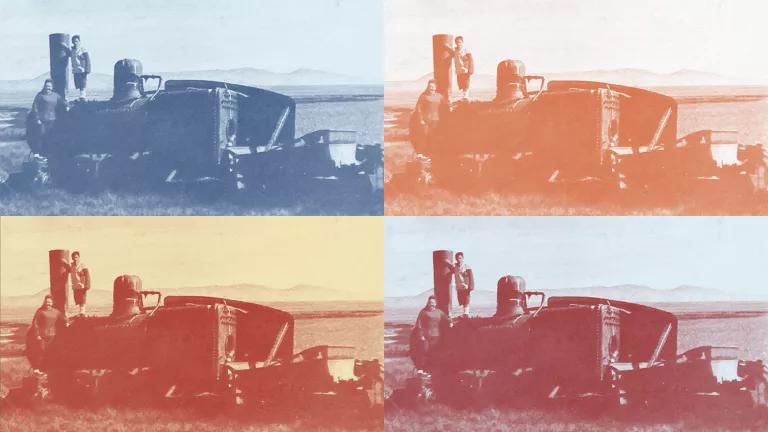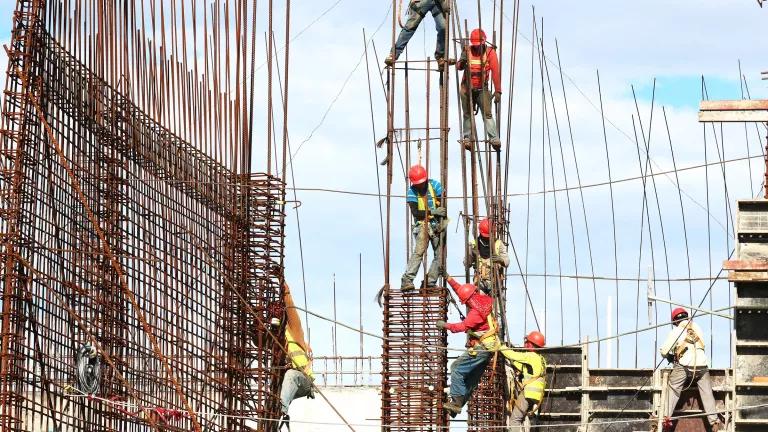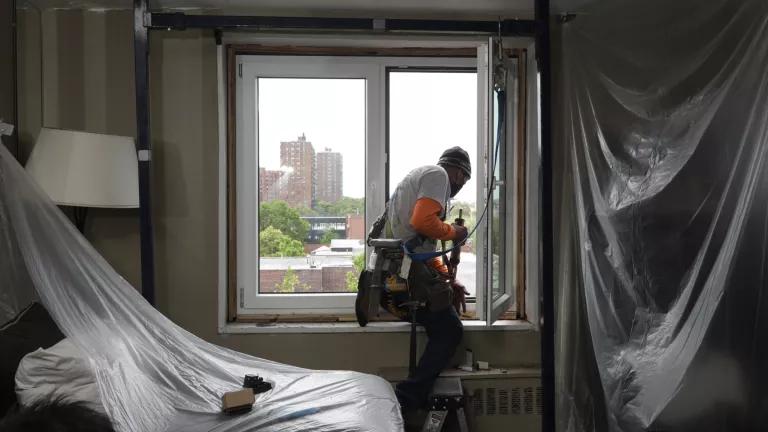Cutting Our Losses: State Policies to Track and Reduce Leakage from Public Water Systems
As states and communities contend with the twin challenges of an aging water infrastructure and a changing climate, leaky water systems threaten the quality and reliability of our drinking water.
Every water system leaks. Altogether, billions of gallons of water are lost every day from U.S. drinking water systems. As states and communities contend with the twin challenges of an aging water infrastructure and a changing climate, leaky water systems threaten the quality and reliability of our drinking water.
Some states are leading the way by requiring best practices for estimating, locating, and reducing leaks. Yet many states and cities are not acting and remain woefully uninformed about the true volume of water losses beneath their streets.
Click on a state to find out what policies are being adopted to report water losses accurately and set targets for water loss reduction. Click on the faucet icon to view an actual water loss audit report in the format recommended by the American Water Works Association (AWWA).

- River basin agencies or other regional organizations where water loss reporting is being specifically addressed
- Water suppliers for which validated water audits are complete and available
- Rudimentary Water Loss Reporting - Some water suppliers are required to make simple estimates of water losses.
- Annual Reporting with Standard Terminology - Reports of water loss using industrywide definitions are required each year.
- AWWA Free Water Audit Software - Utilities are to report water losses in an electronic format developed and endorsed by the water utility industry.
- Validation of Data - Third party experts or trained evaluators review the information and data sources used by utilities to prepare water loss audit reports (“Level 1” validation).
- Volume-Based Performance Benchmarks - Goals or targets are being set to reduce water losses by specific volumes.
In conjunction with World Water Loss Day on December 4, 2020, AWWA has released the 6th version of the AWWA Free Water Audit Software. Fifteen years since its first release, this new version of the software incorporates over 1,000 improvements from user-provided comments and has additional new features such as the Interactive Data Grading feature and the Performance Indicator Dashboard to visualize current performance and potential improvements. This software also now accommodates a wider range of water system setups and has improved its user interface to quantify and track water losses in the water distribution system and improve efficiency and cost recovery more easily.
Click here to learn more about this tool and download the newest version of the Free Water Audit Software.
Model State Legislation
Click here for model state legislation, which can be adapted for use by states that do not yet have the full suite of water loss policies recommended on this website. Please contact us if you would like more information on how this model legislation could work in your state.
Several states have introduced bills similar to our model. Click the links below to track their status:
- Colorado – HB 16-1283
- Hawaii – SB 2645
- Indiana – SB 347
- New Jersey – A 2696 and S 1742
New Water Loss Manual Now Available
The new fourth edition of Water Audits and Loss Control Programs (M36), an essential reference manual published by the American Water Works Association, is now available. M36 is a vital tool for preparing an effective water loss control program. This resource helps drinking water utilities of all sizes to discover how much water is being lost due to leakage, meter error, or water theft. With a clear explanation of the standard water audit methodology and some of the best loss control techniques, this manual empowers water professionals to determine the cost of uncaptured revenue from the non-revenue water (NRW) and minimize future losses. The new M36 offers progressive thinking and even more solutions on the road to accountable water management.
To order online, go to www.awwa.org/M36.
Water Audit “Validation” Explained
While the first step in understanding water leaks and losses is to perform a water audit using AWWA methodology, what makes an audit accurate and reliable? To help address the need for reliable audit reports, the Water Research Foundation has produced two documents on water audit validation, a guidance manual and a research report. The process of validation is explained and a standardized approach to Level 1 validation is laid out.
- Level 1 Water Audit Validation Guidance Manual, 4639A – December 2016
- Utility Water Audit Validation: Principles and Programs, 4639B – January 2017
Water Losses in Your Community
A sustainable community needs a reliable and efficient water delivery system—for public health, fire safety, and good environmental stewardship. The level of water losses from the distribution system can also be seen as an indicator of a community's ability to manage its financial and physical assets. To find out what your community is doing to quantify, locate, and reduce water losses, here are the eight key questions that any citizen, local official, or reporter could ask of your local water supplier to begin a constructive discussion about the condition of your own water system.
Benefits and Costs of Water Loss Audits
How much does a water loss audit cost, and how much savings can it help generate for water utilities?
Click here for summary of available information from case studies around the country.
- "A City Haunted by Ghost Water: Leaking Water Adds Millions to Ratepayers’ Bills"
Read the article >> - "As NJ loses billions of gallons of drinking water annually, lawmakers consider remedy"
Read the article >> - "These leaks can be stopped" (Jan. 2017) Press on outdated infrastructure in New Jersey
Read the article >> - "Aging and leaky water mains cost NJ millions"
Read the article >> - “Water-Wasting Leaks Plague Many Cities,” Wall Street Journal.
Read the article >> [Subscription or payment required] - “Identify water system weakness,” TimesUnion. LTE by Larry Levine.
Read the article >> - "City audit: Austin Water Utility could improve meters, loss-reporting process," KXAN. "A newly released audit shows Austin Water Utility, by one industry measure, leads Texas in its management of water loss, but certain utility reporting processes are 'not efficient' and inaccurate water meters need improvement."
Read the article >> - "Lawmakers Ponder Slapping Regs on Water Loss," Water Online. Coverage of S.B. 555 in CA.
Read the article >> - "Water loss a simmering topic at HPU," Hibbing Daily Tribune. Water loss gets political at a utility in Minnesota.
Read the article >> - California announces groundbreaking Water Loss Control Collaborative: CA-NV AWWA announcement
Read the article >> - Collaborative Framework Aims to Curb Utility Water Loss.
Read the article >> - New Mexico announces statewide Water Loss Control Training Program.
Read the article >> - Water loss plays a part in management changes for water system in Camden NJ.
Read the article >> - Water loss related scandal fuels customer mistrust of water system management.
Read the article >> - "Next Generation Water Loss Tools: AWWA's New & Improving Tools and Publications for Water Loss Control," Georgia Operator; Will Jernigan, PE, explores the evolution of cutting edge tools that can be used to help North American utilities better understand and control their water losses.
Read the article >> - City of Jackson, Mississippi receives a credit rating downgrade; water loss cited as a factor.
Read the article >> - "Poor or rich: The value of water is directly related to what it costs," American Water Works Association Journal; author Melanie K. Goetz notes that the "Perception of value is subjective, influenced by various factors, including a consumer's income level. It's up to water utilities to communicate to all customers that water isn't something to take for granted."
Read the article >> [Subscription or payment required] - "The Art of Water Recovery" (July 2014); NY Times; David Bornstein describes the worldwide interest in water loss control and the emergence of firms focusing on water loss reduction.
Read the article >> - "Auditing Water Losses from Municipal Drinking Water Utilities: Best Practices and Pro-Active State Policies Save Money and Water" (Jan. 2014). In the newsletter of the National Association of State Auditors, Comptrollers, and Treasurers, NRDC's Larry Levine highlights what these state officials, who serve as guardians of the public fisc, can do to promote water loss audits and why they should.
Read the article (see p. 10) >> - "High Leakage Rate Cited in Moody’s Rating of City," Moody's Investors Service.
Read the article >>
- Understanding Water Loss – A short overview explaining the importance of water loss auditing and how it works, from the executive director of the American Water Works Association
- Water Loss Reduction Financing Mechanisms for Drinking Water Distribution Systems – A report by the U.S. Environmental Protection Agency's (EPA) Environmental Financial Advisory Board
- Water Audits and Water Loss Control for Public Water Systems – A 2013 fact sheet by EPA on water audits and water loss control
- Using Water Audits to Understand Water Loss – A 2012 presentation by EPA and AWWA
- Stepping Up Water Loss Control: Lessons from the State of Georgia
- California Senate Bill No. 555 (PDF) – California Senate Bill 555, regarding urban retail water suppliers and water loss audits and detection programs, passed September 2015.
- Water Loss Audits: National Trends & NJ Status – NRDC Presentation to NJ Association of Environmental Authorities, Feb. 7, 2017.
Contact Us
Contact us to learn more about how your state or local utility can improve its water loss policies and practices or to make a suggestion.



